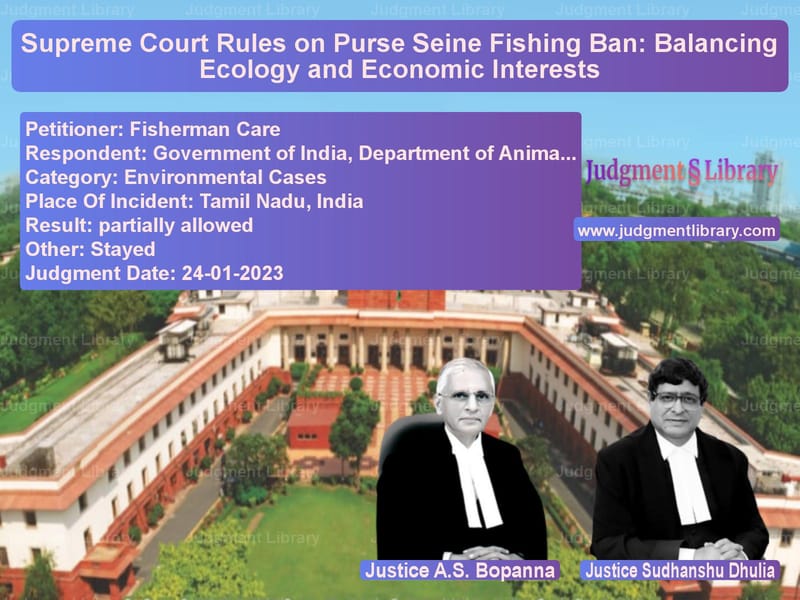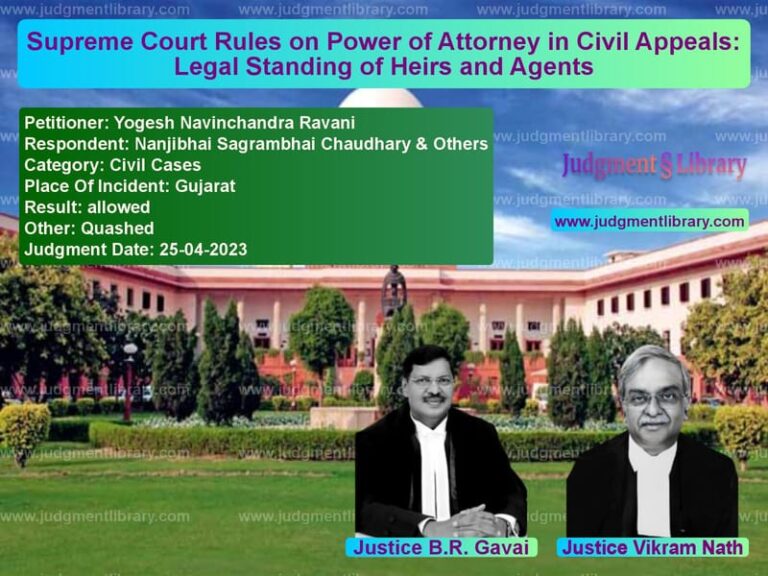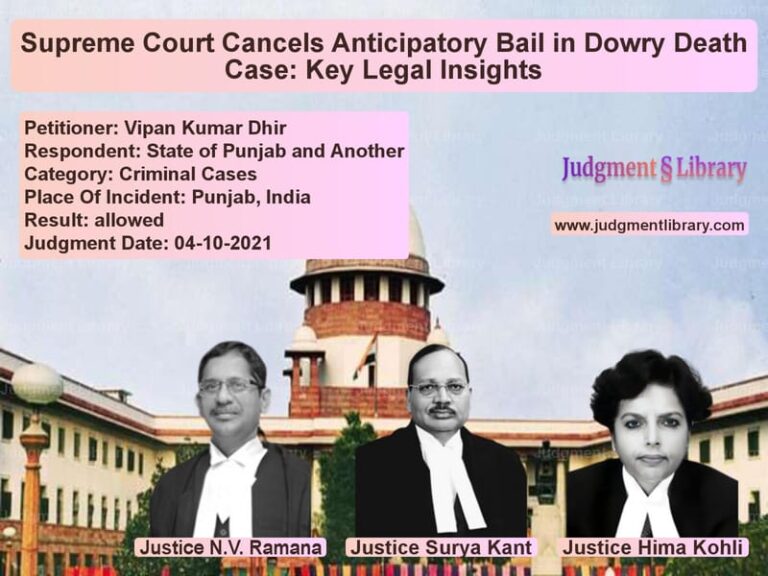Supreme Court Rules on Purse Seine Fishing Ban: Balancing Ecology and Economic Interests
The case of Fisherman Care v. Government of India centers around the controversial ban on Purse Seine Fishing (PSF) within Tamil Nadu’s territorial waters. The Supreme Court had to decide whether the Tamil Nadu government’s restrictions on this fishing method were justified or if they overstepped their jurisdiction.
Purse Seine Fishing is a method that allows large-scale capture of fish using nets that encircle and trap schools of fish. While it is efficient for commercial fishing, it has been criticized for its impact on marine biodiversity and the livelihoods of traditional fishermen. The Tamil Nadu government banned this method within its 12-nautical mile territorial waters, citing ecological concerns and its impact on small-scale fishermen. This ban was challenged in the Madras High Court but was upheld. The petitioners then approached the Supreme Court, arguing that the ban was unjust and limited their ability to fish even beyond Tamil Nadu’s jurisdiction.
Background of the Case
In March 2000, the Tamil Nadu Fisheries Department issued an order banning Purse Seine Fishing within its territorial waters. The state government justified the ban on two main grounds:
- Ecological Concerns: The method indiscriminately captures fish, including juveniles and endangered species, disrupting the marine ecosystem.
- Economic Fairness: Purse Seine Fishing is primarily used by large commercial fisheries, putting small-scale traditional fishermen at a disadvantage.
In 2019, the Madras High Court dismissed a challenge to this ban, agreeing with the Tamil Nadu government that the prohibition was an “informed decision.” However, in 2021, Fisherman Care, a registered association, filed another petition before the High Court, citing an expert report that suggested allowing Purse Seine Fishing under regulated conditions. This petition was also dismissed, leading to an appeal before the Supreme Court.
Key Legal Issues
1. Jurisdiction of Tamil Nadu Government
The petitioners argued that Tamil Nadu’s authority extends only to its territorial waters (12 nautical miles from the coast), while the central government has jurisdiction over the Exclusive Economic Zone (EEZ), which extends up to 200 nautical miles. They contended that while Tamil Nadu could impose restrictions within its own jurisdiction, it had no authority to prevent vessels from traveling through its waters to fish in the EEZ.
2. Impact on Traditional Fishermen
The Tamil Nadu government claimed that Purse Seine Fishing benefits only large commercial operators, depriving small-scale fishermen of their catch. The respondents argued that allowing this method could lead to overfishing and economic disparities.
3. Ecological Consequences
The state asserted that PSF is a “non-selective” method that captures all types of marine life, including species that are protected or not yet mature enough for sustainable fishing. The petitioners countered that many other coastal states, including Gujarat, Kerala, Andhra Pradesh, Odisha, Karnataka, Goa, and West Bengal, allow Purse Seine Fishing, and there is no conclusive evidence proving its environmental harm.
Supreme Court’s Interim Order
Recognizing the need to balance economic and environmental concerns, the Supreme Court issued an interim order permitting Purse Seine Fishing beyond Tamil Nadu’s territorial waters under specific conditions:
- Only registered fishing vessels would be allowed, with valid registrations under both state and central regulations.
- Mandatory Vessel Tracking System (VTS): All approved boats must have an active tracking system to monitor their location.
- Limited Fishing Days: Vessels could operate only on Mondays and Thursdays to regulate fishing activity.
- Restricted Hours: Boats must depart after 8 AM and return to shore by 6 PM the same day.
- Biometric Identification: All crew members must carry photo IDs or biometric cards.
- Designated Landing Centers: Boats must dock only at specific locations assigned by the Fisheries Department.
- Color-coded Identification: Vessels engaged in PSF must have a unique color code for easy identification.
Arguments by the Parties
Petitioners (Fisherman Care and Others)
- The Tamil Nadu government has no jurisdiction beyond its territorial waters.
- Since the central government does not prohibit Purse Seine Fishing in the EEZ, Tamil Nadu’s restrictions are unlawful.
- Many families depend on this method, and a prolonged ban would cause financial ruin.
Respondents (Government of Tamil Nadu)
- Purse Seine Fishing is an exploitative technique that causes overfishing and harms biodiversity.
- Allowing large-scale commercial fishing would create economic disparity by depriving small-scale fishermen of their livelihood.
- Monitoring fishing activities beyond territorial waters is impractical, making enforcement difficult.
Impact of the Judgment
The Supreme Court’s ruling provides temporary relief to the petitioners while ensuring that regulations are in place to prevent ecological damage. The judgment highlights several key takeaways:
- State vs. Central Authority: The ruling clarifies that while states can regulate their territorial waters, they cannot impose restrictions on activities in the EEZ without central government approval.
- Balancing Conservation and Commerce: The judgment acknowledges the economic benefits of commercial fishing while ensuring safeguards to protect marine biodiversity.
- Need for Further Study: The Court emphasized the lack of a comprehensive report on Purse Seine Fishing’s ecological impact and called for further scientific research.
Conclusion
The Supreme Court’s interim order in this case is a significant step toward resolving the conflict between commercial and traditional fishing interests. It ensures that economic opportunities are preserved for those dependent on Purse Seine Fishing while incorporating strict regulations to minimize environmental harm. The final verdict, after further study, will determine whether the restrictions will be permanently lifted or reinforced.
Petitioner Name: Fisherman Care.Respondent Name: Government of India, Department of Animal Husbandry, Dairying and Fisheries.Judgment By: Justice A.S. Bopanna, Justice Sudhanshu Dhulia.Place Of Incident: Tamil Nadu, India.Judgment Date: 24-01-2023.
Don’t miss out on the full details! Download the complete judgment in PDF format below and gain valuable insights instantly!
Download Judgment: fisherman-care-vs-government-of-india,-supreme-court-of-india-judgment-dated-24-01-2023.pdf
Directly Download Judgment: Directly download this Judgment
See all petitions in Environmental Cases
See all petitions in Public Interest Litigation
See all petitions in Constitution Interpretation
See all petitions in Judgment by A. S. Bopanna
See all petitions in Judgment by Sudhanshu Dhulia
See all petitions in partially allowed
See all petitions in Stayed
See all petitions in supreme court of India judgments January 2023
See all petitions in 2023 judgments
See all posts in Environmental Cases Category
See all allowed petitions in Environmental Cases Category
See all Dismissed petitions in Environmental Cases Category
See all partially allowed petitions in Environmental Cases Category







